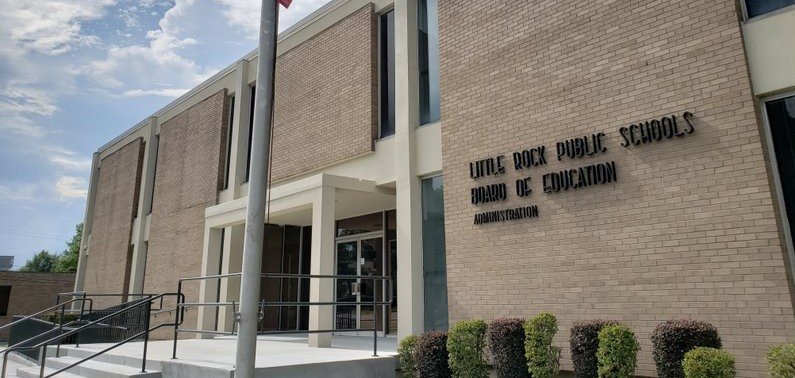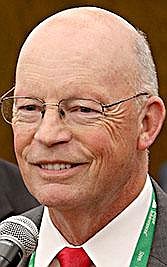Baker Kurrus, a former school board member and superintendent, and Gary Newton, executive director of a parent/school choice advocacy organization, are among some 150 people who have put into writing in recent days their views on the future of the state-controlled Little Rock School District.
More than 130 of the commenters did so anonymously in response to an open-ended, four-question survey on the topic that was established for the Arkansas Board of Education.
Other writers, Newton and Kurrus among them, did not use the state-provided questionnaire but otherwise offered a range of recommendations, options and commentary about the 22,600-student district that is completing its fifth year under state control.
In January 2015, the state dismissed the locally elected school board and placed the superintendent under the direction of the state education commission because of chronically low test results in six of the district's 48 schools.
The nine-member state Education Board by law must decide in the coming months whether to return the capital city school system, in whole or in part, to the management of a locally elected school board or must otherwise annex, consolidate or reconstitute the system.
The Education Board has held five public forums and a work session in recent weeks on the topic.
Another Education Board work session is set for 5:30 p.m. Wednesday to be followed by the board's regular monthly meetings at 10 a.m. Thursday and 9 a.m. Friday. The Thursday agenda includes quarterly reporting by all districts -- including Little Rock -- that are under state control.
Newton's and Kurrus' writings to the board are of interest not only because of their length and detail but also because of the men's public histories with the Little Rock district.
Kurrus, a longtime Little Rock School Board member, a state-appointed district superintendent in the 2015-16 school year and a recent mayoral candidate, focused largely on the differences in terms of poverty, disabilities, mobility and English fluency of students served by the Little Rock district and by the large, independently run, publicly funded charter schools in the city.
"LRSD's so-called failing schools appear to have student bodies with needs that exceed those found at LISA Academy and eSTEM [charter schools], " Kurrus wrote in part in a six-page message to state leaders.
"[A]ny dual system, which causes the isolation, concentration and segregation of the most needy students will not stand," he said. "The State of Arkansas must now address and ameliorate this duality," he said. "Establish local control in a way that builds a unitary system in Little Rock," he recommended.
Newton, executive director of Arkansas Learns, offered three sets of options for the Education Board to consider.
"In every suggestion, we have prioritized the best interests of students over the self interests of adults and trust you will do the same with your decisions, " Newton wrote in nearly 20 pages of information he sent to the Education Board.
Two of the options suggested by Newton call for creating a nine-member school board elected from zones and for discontinuing contract negotiations between the district with the Little Rock Education Association employees union.
Part of one option calls for the state to retain the authority to hire and fire the Little Rock superintendent. Another option envisions the state retaining control of all schools in the district that have state-issued F grades. When an F school achieves a C grade, parents would vote on whether to return the school to the Little Rock district.
A third option calls for converting the current district into an entity with responsibility for funding, infrastructure and shared services. The schools would be divided into three autonomous districts: Central, Southwest and West.
"The only thing better than 'local control' is more 'local control,'" Newton wrote. "Instead of one board of seven or nine, we could have three boards of seven for 21 total."
FOUR QUESTIONS
The 265-pages of written submissions to the state, including survey responses, are available for public reading on the Arkansas Department of Education website:
Education Board Chairman Diane Zook of Melbourne and Little Rock said Friday that the board will continue to accept survey responses and other written comments for the foreseeable future.
The address to send email on the topic is: ade.lrsdfeedback@arkansas.gov.
"People can send in until we set an agenda where we are going to actually take motions and recommendations," Zook said. We encourage all of that," she added about communications from the public on the matter." Even people who stop us on the street or calling us on the phone -- we're trying to make sure those [comments] get heard as well."
The board work session on Wednesday -- on the heels of a work session this past Tuesday -- is meant to enable Education Board members to review and question information presented at the first session, as well as brainstorm, said Zook, who anticipates that staff from the Division of Elementary and Secondary Education will be on hand to respond to any questions.
She noted that some of the board members were participating in the Tuesday session on the speakerphones and couldn't always hear, and one board member had a commitment with another school district that night and was absent from the work session.
The Education Board's survey's four questions -- on the state agency website -- each have multiple parts.
The first question asks what are the considerations in returning the district to a locally elected school board and are there benefits to having an appointed versus an elected board for an interim time.
The second question asks about reconstituting the district if one or more schools do not meet criteria that enable the district to exit state control. Exit criteria rely on student results on the ACT Aspire exams in 2018 and 2019, as well as on implementation of instructional programs and teaching strategies.
The question asks for the pros and cons of the state retaining just those schools that don't meet the criteria, or closing those schools.
The third question deals with resources for the lowest performing schools, including how staff might be assigned to the schools and how incentives might be provided to ensure that highly experienced, effective teachers seek to work in the schools.
The fourth question asks for ideas on additional academic support and services to be provided at schools that don't meet exit criteria and whether private funds should be used to make the support available.
SURVEY RESPONSES
The questions elicited a wide range of responses.
Survey responder #34's answers were typical of many. "There should NOT be an appointed school board. That is clearly taxation without representation. Give us back our district," the writer said, adding later, "No more closing schools. Stop making it harder on our students and families to have neighborhood schools."
The same responder accused the state leaders of not caring about teachers, as evidenced by the Education Board's waiving the Teacher Fair Dismissal Act job protections in the district.
"So to say that you want to put the 'most effective teachers and administrators' in the lowest performing schools -- wow, you have a lot of nerve" and "Stop blaming teachers for all the problems."
And on the question of private money, the responder said there is a lack of trust there "unless someone wants to hand over a giant check to LRSD and then walk away. Otherwise I am afraid that the 'private' money would actually be yet another way to make our public schools in to charter schools."
Responder #43's answers represented those with contrasting points of view on the district's future.
"The school board should be appointed," the responder said. "The local community is unable to run an effective school board. Electing local residents to run the school board would be a race to the lowest standard."
The same responder said that schools that don't meet exit criteria should remain under state control and, in regard to providing additional resources to those schools, "Why would you waste your resources like the best teachers ... on kids that are not raised properly and have no interest in education? Don't throw your best resources down a hole."
Responder #47 urged the state to consider examples of urban, high-minority, high-poverty districts that have successfully employed highly skilled staff.
"Please research Mobile County Public Schools in Ala., as well as their strategic partner, the Mobile Education Foundation," the responder wrote. "We don't have to reinvent the wheel. There are creative ways to maximize every cent of city, state and federal dollars. There are ways to recruit private partners in our search for excellence."
A Section on 09/07/2019


